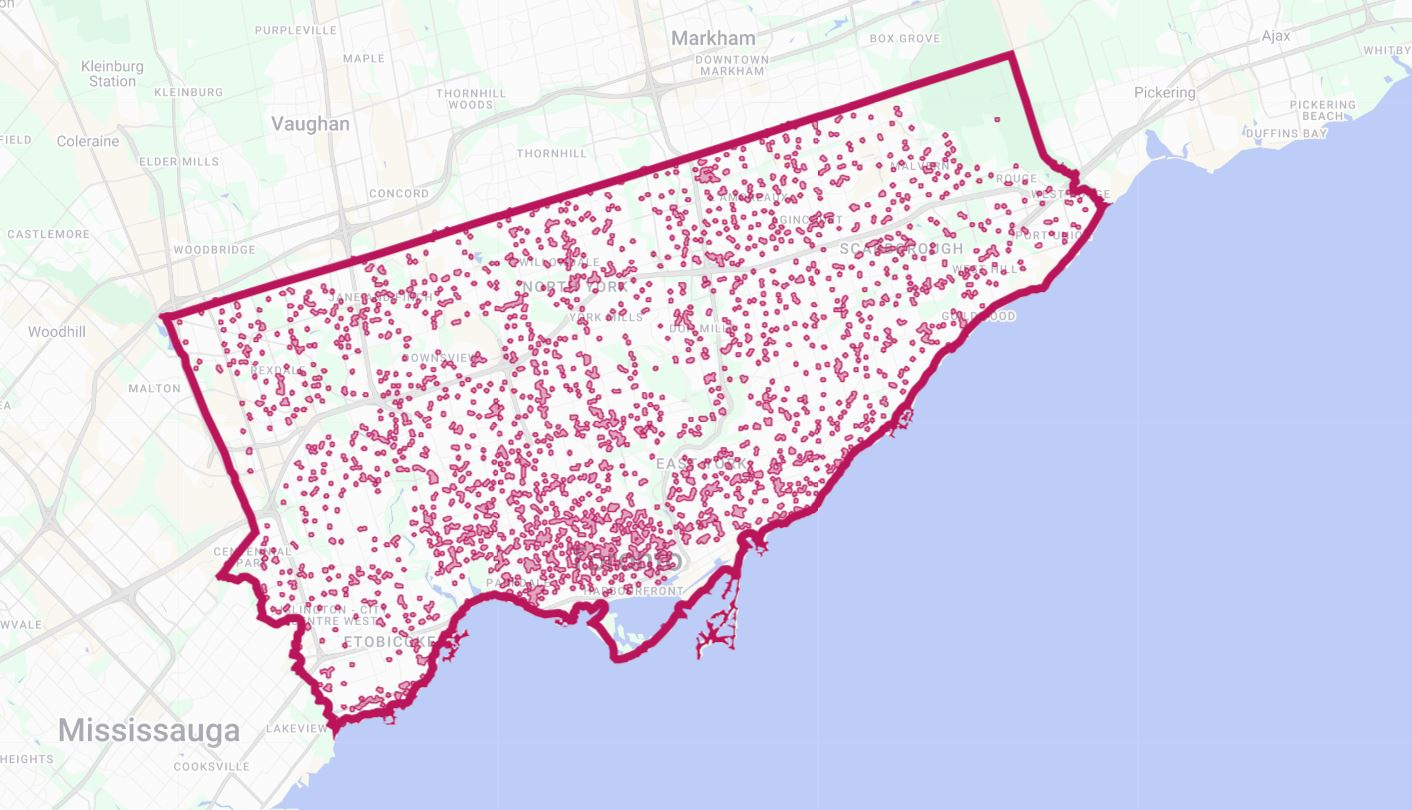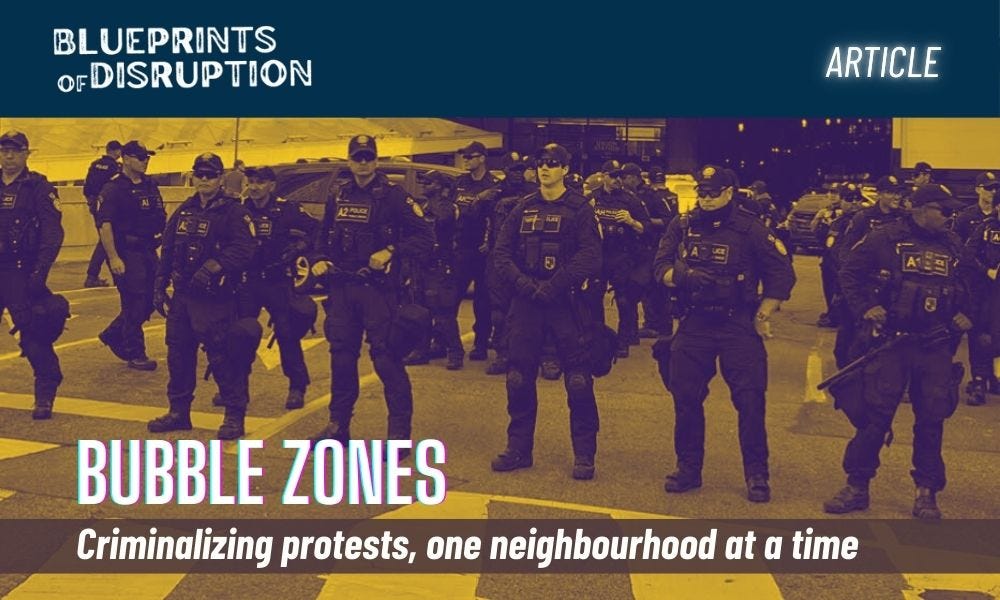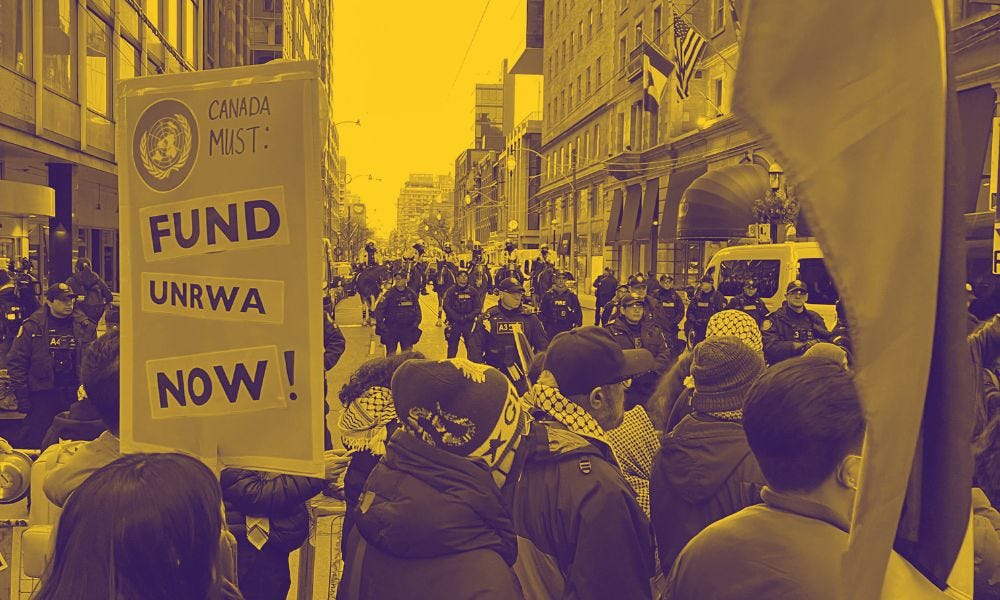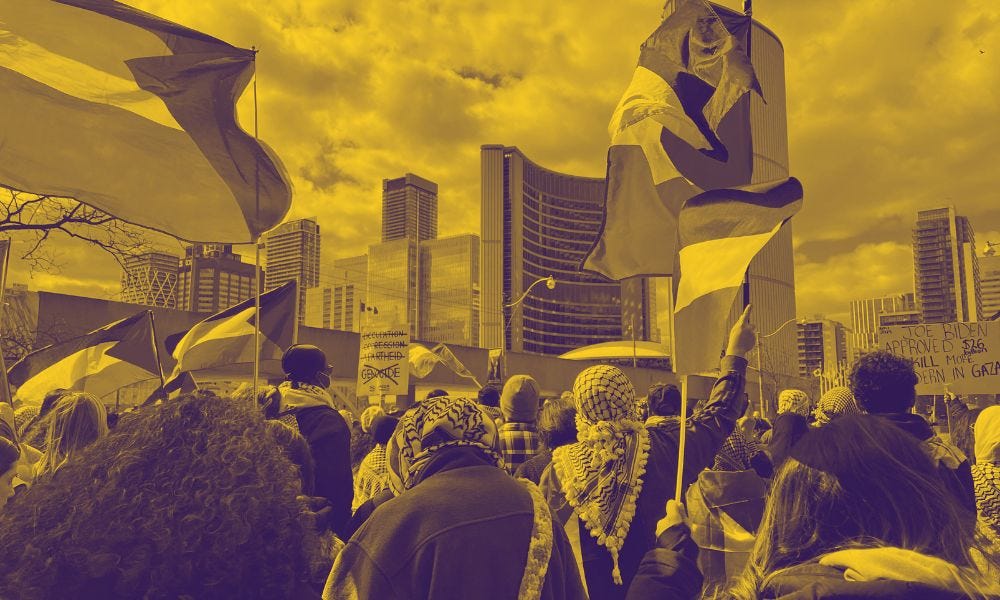Bubble Zones: Confining Protests
Lawfare to limit our freedom of speech and right to protest.
“The people's power comes from our collective ability to put pressure on the state by disrupting the status quo - but when we are confined to zones, we lose our power.” ~ Rachelle Friesen, Toronto Legal Support Committee
Following in the footsteps of its northern neighbours, Brampton and Vaughan, the Toronto City Council is looking to create “bubble zones” that would prohibit protests in large parts of the city. This proposed bylaw is a clear move to suppress the Palestinian Solidarity Movement, justify increased police spending and further criminalize protests.
The zones would create buffers around what proponents are calling “vulnerable institutions”. Although still undefined, this is expected to include schools, community centres, and places of worship, affecting almost 4,000 locations across the city1.

Opposition to Bubble Zones Grows
Public consultations are underway on the proposed bylaw; they run until May 1st, with a vote soon to follow. People (even non residents) can complete the online survey or register to attend virtual consultations. The first session, held on April 22, found an overwhelming 86% of participants opposed the bylaw2. This result is largely in thanks to the many Toronto based community organizations who have ramped up the pressure and launched campaigns against the bylaw. Groups big and small, focused on a variety of issues, have been encouraging their supporters to contact Mayor Olivia Chow and their own councillors, and pointing people towards the city’s public consultation portal.
Link to the City of Toronto’s Public Consultation Portal for the bylaw (consultation closes May 1)
While many groups have condemned the bylaw, others have also promised to defy it. A post from Toronto Indigenous Harm Reduction states that “Indigenous Peoples will not yield to bylaws limiting our sovereign freedom of expression and movement on our territories”. On top of voicing concerns over the restriction on protestors’ rights, Jane Finch Action Against Poverty and others have also called into question the consultation process, saying it “lacks transparency, safeguards, and credibility”. On April 17th, the 43rd anniversary of the Canadian Charter of Rights and Freedoms, unions and various social justice groups also staged a protest against the Bubble Zone bylaw outside Toronto City Hall. A handful of City Councillors stood with the group; however, the dominant position on Council still supports the idea.
City Halls Seems Already Sold
In December 2024, a vote to push the bylaw through passed 17-5. It is possible that some councillors might reject the final product out of public pressure or a reassessment of the final product, but this outcome does not seem likely. The anti-Palestinian narratives being used to fuel support for further restrictions on freedom of expression have not been limited to right-wing politicians. Mayor Olivia Chow’s first comments post October 7th included calls for more policing of Palestinians. Chow has maintained that position ever since, and has even increased the Toronto Police Services budget over the past months to achieve this aim.
“For the last two years we’ve seen the state chip away at our right to protest and right to freedom of speech/expression and find ways to criminalize those who challenge the status quo.” ~ Rachelle Friesen, TLSC
In a statement from the Toronto Legal Support Committee (TLSC), we’re reminded that the Toronto Police Services (TPS) “already does enforce bubble/protest zones - they do not need special laws to do so”.3 We see this in police lines, sometimes two officers deep, blocking routes of marches or denying access to buildings. Activists are often arrested and removed from locations arbitrarily earmarked for protection by the powerful. Regardless of the issue, mischief charges, trespass tickets and police violence are already a matter of routine at protests.
Anti-Genocide is not Anti-Jewish
There have been many attempts to equate anti-genocide protests as anti-Jewish simply based on the location of the protests. A protest at an overpass on the Avenue Road bridge in midtown Toronto, part of a multi-location banner drop, was deemed anti-semitic simply because it was located in a neighbourhood with a significant Jewish population. In response, Police reacted with disproportionate force, leading to injuries among several protesters. Meanwhile, media outlets and politicians quickly condemned the demonstrations. Even Toronto Mayor Olivia Chow suggested that certain neighborhoods should be off-limits to protests.
The most explosive case that helped to fuel support for Bubble Zones, specifically with regards to places of worship, was the protest in March 2025 outside a synagogue in Thornhill (Vaughan), a suburb immediately north of Toronto. Inside, a real estate company was marketing the sale of land located within illegal settlements in the occupied West Bank, effectively selling stolen Palestinian land and furthering the occupation. This is of course illegal under international (and Canadian law); however, legal implications were of little concern to the authorities. Significant community resources were spent to ensure unimpeded entry to the event; to create a ‘bubble’ around the building. Although multiple incidents of violence at the hands of Zionists were recorded and reported – it was pro-Palestine protesters who were criminalized.
Zionist supporters, like Toronto’s City Councillor James Pasternak predictably leveraged this moment, ultimately tabling the current bubble law motion. He also helped set the stage by repeatedly using his social media feed and official releases to convince his constituents that anti-genocide protests are antisemitic and inherently violent.4 The longtime Councillor claims he “knows peaceful assembly when he sees it” and insists that despite warnings from City Staff, the bylaw doesn’t violate the Charter (it does).
The Federal Liberals Are on the Same Page
Even if folks are successful in changing the mind of some Councillors, and Council rejects this bylaw, Mark Carney has signaled that the Liberals will make passing a federal version of the law a priority. Poilievre would surely do the same, if not worse, and we haven’t been able to count on the NDP to prioritize anything but dental care in a long time. If this does go through at the federal level, that means changes to the Criminal Code and more severe consequences for violations.
Protest bubble laws are also not without precedence. “Safe Access Zones” have been adopted in most Provinces to protect the safety and privacy of those seeking an abortion and the healthcare workers providing them5. These zones were then expanded at the onset of COVID to stop anti-vax protests from targeting hospitals. Lawyers will undoubtedly battle this out, but only after folks have been hit with (up-to) $100,000 in fines and/or criminal charges. It’s really only speculation as to who will win that fight, and one has to always factor in the Palestinian exception.
It has been long understood that some rules just don’t apply in the fight for a Free Palestine. Whether that be the Charter or Codes of Conduct at Universities, the suppression of Palestinian voices gets a pass in all our colonial institutions. There is little to suggest that this new wave of Bubble Laws will be any different. Nor will it be limited to shutting down criticism of Israel.
With no real definition on what constitutes a “vulnerable institution”, this type of lawfare can easily be weaponized against all our movements. Should the bylaw be passed in Toronto and elsewhere, organizations and individuals need to adjust to new realities and fight back. For a lot of activists, that means reflecting on the meaning of civil disobedience, reassessing tactics, and possibly building up a whole new set of skills. The plus side is that this will be another opportunity to create community, even if it is around a crisis.
We also need to continue to build legal support tools and networks. This means training more movement lawyers and legal observers on the complexities of representing a movement as well as an individual arrested. The Toronto Legal Support Community is a great example of an organization working in this sphere. On top of their work defending arrestees, the group also provides a myriad of other kinds of support to lessen the blow for individuals facing criminal charges, and the harassment by Police and Zionists that often comes with it.
“The state is attempting to spatially confine protests so that solidarity merely becomes a theatre or public spectacle that people can witness only if they desire to do so. It is the responsibility of the people to ensure this does not happen.” ~ Rachelle Friesen, TLSC
Listen to Dalia Awwad and Rachelle of the Toronto Legal Support Committee in our episode on Supports Amid State Suppression, where they go into more detail about the work they do.
These kinds of support networks will allow us to be more prepared for any new tool utilized against our movements. Our creativity, strength and resilience are why the powers that be keep having to reinvent all these new ways to demonize us, jail us, and wear us down.
So don’t let the prospect of new Bubble Laws discourage you. Let it spur you and your comrades to be inventive and defiant in your responses. Allow yourselves to push past your comfort zones and start forming wider coalitions of resistance.
Whatever you do, keep on disrupting.
Calls to Action
Participate in the City of Toronto’s public consultation on the bylaw (survey & virtual pubic sessions).
Support the Toronto Community Justice Fund
Resources
MAP: How a 'bubble zone' protest bylaw could cover most of central Toronto (TorontoToday.ca)
‘Bubble zones’ limit protests outside communities of faith in Vaughan, Ont. Are they a good idea? (Broadview Magazine)
Should governments legislate ‘bubble zones’ around places of worship? Some say yes (The Canadian Press)
Visit the website for the full archives and check out our playlists on: Community Organizing 101, Free Palestine, Tenant Power and other topics.
Follow Blueprints of Disruption on your favourite podcast platform.
Algorithms are not kind to us. If you appreciate our content, help us spread the word on Bluesky, Instagram, X and Youtube.
All of our content is free - made possible by the generous sponsorships of our subscribers.
📺CATCH OUR RABBLE RANTS EVERY FRIDAY AT 12pm E.T. on our YouTube Channel.
Full statement from Rachelle of the Toronto Legal Support Community
“For the last 2 years we have seen the state chip away at our right to protest and right to freedom of speech/expression and find ways to criminalize who challenge the status quo. This is the state's attempt to create protest zones - confined spaces where "protest" can happen with very little disruption or impact on the general public. Yet, by definition a protest is supposed to be disruptive - a protest that does not disrupt the regular routine of the general public is a merely a group walk of frustrated people. The people's power comes from our collective ability to put pressure on the state by disrupting the status quo - but when we are confined to zones, we lose our power. It also needs to be noted that TPS has said and already does enforce bubble/protest zones - they do not need special laws to do so. Whether the law exists or not, the state is attempting to spatially confine protests so that solidarity merely becomes a theatre or public spectacle that people can witness only if they desire to do so. It is the responsibility of the people to ensure this does not happen.”
Safe Access Zone Laws and Court Injunctions in Canada (Abortion Rights Coalition of Canada)





